|
|
|
Sort Order |
|
|
|
Items / Page
|
|
|
|
|
|
|
| Srl | Item |
| 1 |
ID:
079237
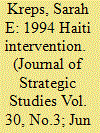

|
|
|
|
|
| Publication |
2007.
|
| Summary/Abstract |
Observers of United States (US) interventions have almost universally characterized the 1994 Haiti intervention as multilateral, a model for how international cooperation can achieve common security goals. A closer analysis of the intervention reveals that the planning and execution of the intervention were almost entirely unilateral and therefore cost the US few if any of the theoretical costs of coalition warfare, including interoperability and policy compromise. Mapped onto the unilateral strategy and operation of the intervention, however, was a multilateral diplomatic effort that secured United Nations Security Council authorization and provided a cover for an intervention that the US had already planned and intended to execute with or without that authorization. That the US sought a multilateral cover for an intervention that it could easily accomplish unilaterally shows the importance of two factors: A domestic audience that opposed unilateral peacekeeping but would accept using US resources as part of a broader multilateral operation, and a local population that would be more responsive to a multilateral coalition than a use of force that was perceived to be unilateral. The Haiti intervention shows that the determinants of success in operations other than war are as much political as military. When the US already has overwhelming military superiority vis-à-vis its adversary, building military coalitions becomes as much about enlisting political support as aggregating material capability.
|
|
|
|
|
|
|
|
|
|
|
|
|
|
|
|
| 2 |
ID:
138302
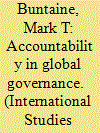

|
|
|
|
|
| Summary/Abstract |
International organizations frequently lack accountability to both states and civil society groups. States often face difficulties monitoring the actions of international organizations. Civil society groups do not often enjoy direct influence over decision-making within international organizations. To address these challenges, states have created accountability mechanisms for international organizations. Accountability mechanisms allow civil society groups to submit complaints about the performance of international organizations. They take the form of ombudsmen offices, accountability panels, and complaint procedures. Little is known about when and why these mechanisms constrain behavior by international organizations that runs counter to the mutual interests of states and civil society groups. Using the World Bank Inspection Panel as a test case, I show that monitoring by civil society groups alters lending at the World Bank when it enhances oversight by powerful states. By combining their abilities in sanctioning and monitoring, states and civil society groups can promote accountability at international organizations.
|
|
|
|
|
|
|
|
|
|
|
|
|
|
|
|
| 3 |
ID:
185096
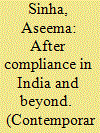

|
|
|
|
|
| Summary/Abstract |
Using India as a theory building case, this paper puts forward a theoretical framework for understanding countries’ responses to global rules and implementation effects across diverse global governance regimes and contexts. The initial premise for this paper is that the strategic structure of implementation dilemmas faced by states and actors within countries need to be understood in addition to design dilemmas. Successful global regimes must not only solve cooperation and uncertainty problems at the initial stages in choosing the right institutional matrix, but also ‘require changes in domestic institutions.’ The need to change domestic institutions creates certain implementation dilemmas. These dilemmas are a joint product of the institutional design, specific policy issue and the domestic logic of responses after international agreements have been signed. This broader idea helps understand a wide variety of India’s interactions across global governance institutions. I also suggest a novel empirical strategy of cross-institutional analysis to assess implementation dilemmas. While we have numerous cross-national studies of how compliance occurs in a wide variety of countries, we lack theory-driven, empirically grounded, comparative studies of a single country or a group of countries across diverse global regimes. Such a framework can help us better understand how countries interact with a variety of global institutions and the reciprocal effects. This framework is then used to understand India’s interactions with diverse global regimes in an illustrative manner in this article, and in greater detail by other authors in the section published in this issue of Contemporary South Asia.
|
|
|
|
|
|
|
|
|
|
|
|
|
|
|
|
| 4 |
ID:
193067
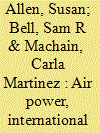

|
|
|
|
|
| Summary/Abstract |
Can the presence of international organizations reduce civilian deaths caused by aerial bombing? This commentary examines this question in the specific context of the U.S.-led war in Afghanistan. We evaluate this based on interviews conducted with members of international organizations that were present in Afghanistan during the conflict, existing intergovernmental organizations, nongovernmental organizations, and government reports, and with quantitative data on civilian casualties between 2008 and 2013. We conclude that there is tentative evidence from Afghanistan that international organizations can in fact reduce the severity of civilian killings that result from the use of air power. However, there is much need for greater data sharing to more fully answer this important question.
|
|
|
|
|
|
|
|
|
|
|
|
|
|
|
|
| 5 |
ID:
118170
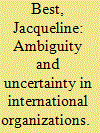

|
|
|
|
|
| Publication |
2012.
|
| Summary/Abstract |
How do international organizations deal with the persistent challenge of uncertainty? The most intuitive answer is through regulation. Yet, rules are not always the best solution in times of uncertainty or in dealing with complex and diverse problems. More ambiguous policies that leave room for interpretation, can often be more functional for an international organization (IO); moreover, ambiguities can also be a source of power-and are therefore often a subject of conflict among institutional actors. Focusing on the case of International Monetary Fund conditionality policy, this article provides several key insights into IO practices. It provides an account of the different forms that ambiguity can take in international organizations and develops an explanation for why institutional ambiguities appear and persist. Looking inside the IO black box, the study examines how interests, institutional culture, and legitimacy concerns shape actors' support for ambiguity, and how these preferences combine with broader structural factors to produce a predisposition toward institutional ambiguity. Finally, this article points toward certain implications of organizations' tendency toward ambiguity, suggesting that this may play an important role in enabling institutional expansion.
|
|
|
|
|
|
|
|
|
|
|
|
|
|
|
|
| 6 |
ID:
034909
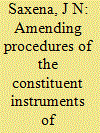

|
|
|
|
|
| Publication |
Moradabad, Kumar Press, 1972.
|
| Description |
226p.
|
|
|
|
|
|
|
|
|
|
|
|
Copies: C:1/I:0,R:0,Q:0
Circulation
| Accession# | Call# | Current Location | Status | Policy | Location |
| 010939 | 341.2/SAX 010939 | Main | On Shelf | General | |
|
|
|
|
| 7 |
ID:
124432
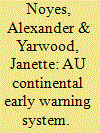

|
|
|
|
|
| Publication |
2013.
|
| Summary/Abstract |
Despite criticism from scholars, the Continental Early Warning System (CEWS) at the African Union (AU) has recently made significant progress in its capacity to monitor, analyse, and provide warning of impending conflict situations in Africa. However, CEWS remains constrained by human resource limitations, inchoate cooperation and information sharing with the early warning efforts of regional organizations, and unsystematic coordination with the various AU organs focusing on peace and security. Additionally, although the early warning-early response gap is narrowing at the AU, early response mechanisms continue to be constrained by limited capacity and issues of political will, as high-level political disagreements and issues of sovereignty militate against effective preventive action. Based on over two-dozen interviews with senior-level CEWS and AU officials, along with other relevant stakeholders, this paper highlights recent operational progress, identifies remaining gaps, and forwards policy options for the AU and international community to build on the gains of CEWS.
|
|
|
|
|
|
|
|
|
|
|
|
|
|
|
|
| 8 |
ID:
092087
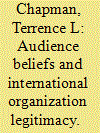

|
|
|
|
|
| Publication |
2009.
|
| Summary/Abstract |
Recent work suggests that multilateral security institutions, such as the UN Security Council, can influence foreign policy through public opinion. According to this view, authorization can increase public support for foreign policy, freeing domestic constraints. Governments that feel constrained by public opinion may thus alter their foreign policies to garner external authorization. These claims challenge traditional realist views about the role of international organizations in security affairs, which tend to focus on direct enforcement mechanisms and neglect indirect channels of influence. To examine these claims, this article investigates the first link in this causal chain-the effect of institutional statements on public opinion. Strategic information arguments, as opposed to arguments about the symbolic legitimacy of specific organizations or the procedural importance of consultation, posit that the effect of institutional statements on public opinion is conditional on public perceptions of member states' interests. This article tests this conditional relationship in the context of changes in presidential approval surrounding military disputes, using a measure of preference distance between the United States and veto-wielding members of the UN Security Council. Findings indicate that short-term changes in presidential approval surrounding the onset of military disputes in the United States between 1946 and 2001 have been significantly larger when accompanied by a positive resolution for a Security Council that is more distant in terms of foreign policy preferences. The article also discusses polling data during the 1990s and 2000s that support the strategic information perspective.
|
|
|
|
|
|
|
|
|
|
|
|
|
|
|
|
| 9 |
ID:
172845
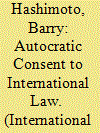

|
|
|
|
|
| Summary/Abstract |
This article contributes to an understanding of why autocrats have accepted the jurisdiction of the International Criminal Court. Leveraging their ability to obstruct their own prosecution, autocrats have traded off the risk of unwanted prosecutions against the deterrent threat that prosecutions pose to political rivals and patrons of their enemies conspiring to oust them. The risk of unwanted prosecutions and the court's deterrent threat both arise because ICC prosecutions credibly communicate guilt for international crimes to capital-disbursing democracies, which may, insofar as possible, use leader-specific economic statecraft to prevent the administration of foreign states by those whom the court signals are guilty of international crimes. Analysis using fixed effects and matching shows that a greater reliance on capital publicly financed by democracies increased the probability that a state accepted the court's jurisdiction only when it was an autocracy (1998–2017). ICC jurisdiction also lengthened the tenure of autocrats and reduced the severity of civil conflict in autocracies.
|
|
|
|
|
|
|
|
|
|
|
|
|
|
|
|
| 10 |
ID:
153603
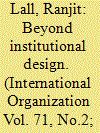

|
|
|
|
|
| Summary/Abstract |
International organizations (IOs) have long been a central focus of scholarship in international relations, yet we know remarkably little about their performance. This article offers an explanation for differences in the performance of IOs and tests it using the first quantitative data set on the topic. I argue that the primary obstacle to effective institutional performance is not deviant behavior by IO officials—as conventional “rogue-agency” analyses suggest—but the propensity of states to use IOs to promote narrow national interests rather than broader organizational objectives. IOs that enjoy policy autonomy vis-à-vis states will thus exhibit higher levels of performance. However, in the international context policy autonomy cannot be guaranteed by institutional design. Instead, it is a function of (1) the existence of (certain types of) institutionalized alliances between IOs and actors above and below the state; and (2) the technical complexity of IO activities. I provide empirical evidence for the argument by constructing and analyzing a cross-sectional data set on IO performance—based in part on a new wave of official government evaluations of IOs and in part on an original survey of IO staff—and conducting a comparative case study in the realm of global food security.
|
|
|
|
|
|
|
|
|
|
|
|
|
|
|
|
| 11 |
ID:
168197
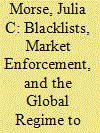

|
|
|
|
|
| Summary/Abstract |
This paper highlights how international organizations can use global performance indicators (GPIs) to drive policy change through transnational market pressure. When international organizations are credible assessors of state policy, and when monitored countries compete for market resources, GPIs transmit information about country risk and stabilize market expectations. Under these conditions banks and investors may restrict access to capital in noncompliant states and incentivize increased compliance. I demonstrate this market-enforcement mechanism by analyzing the Financial Action Task Force (FATF), an intergovernmental body that issues nonbinding recommendations to combat money laundering and the financing of terrorism. The FATF's public listing of noncompliant jurisdictions has prompted international banks to move resources away from listed states and raised the costs of continued noncompliance, significantly increasing the number of states with laws criminalizing terrorist financing. This finding suggests a powerful pathway through which institutions influence domestic policy and highlights the power of GPIs in an age where information is a global currency.
|
|
|
|
|
|
|
|
|
|
|
|
|
|
|
|
| 12 |
ID:
184661
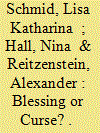

|
|
|
|
|
| Summary/Abstract |
Earmarked funding to international organizations (IO s) has increased significantly over the past two decades. International relations scholars have examined the causes of this trend, but know less about its effects on UN entities. This article identifies different types of earmarked funding, varying from low to high discretion delegated to IO s. Secondly, it examines trends in the UN Development Programme and UN Children’s Fund and finds that both have significant proportions of earmarked funding with low discretion. Drawing on thirty interviews, the article notes four implications of tightly earmarked financing: 1) higher transaction costs for IO s; 2) less predictable funding; 3) overhead costs that are rarely covered; and 4) increasing competition for financing. Overall, the article highlights that earmarked financing exists on a spectrum from tight to minimal control by donor states, and this has important implications for multilateralism.
|
|
|
|
|
|
|
|
|
|
|
|
|
|
|
|
| 13 |
ID:
129029
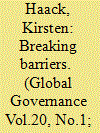

|
|
|
|
|
| Publication |
2014.
|
| Summary/Abstract |
The appointment of Christine Lagarde in 2011 to the leadership of the International Monetary Fund may have been a highlight for women's representation in international organizations, suggesting that the final glass ceiling for women in global governance has been broken. However, this article shows that leadership and representation by women in global governance continues to be curtailed by "glass walls" on the one hand, and flexible glass ceilings on the other. While women in UN agencies today stand on firmer floors, relying on a stronger institutional framework and increasing numbers of women working at all levels of the UN system, women are channeled into gender-specific portfolios, creating glass walls. Moreover, glass ceilings, once shattered, may indeed resettle as recent staff changes by Ban Ki-moon show. Thus, the picture of women's representation and gender equality in UN leadership is a mixed one.
|
|
|
|
|
|
|
|
|
|
|
|
|
|
|
|
| 14 |
ID:
186187
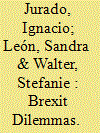

|
|
|
|
|
| Summary/Abstract |
How do voters want their governments to respond when another country unilaterally withdraws from an international institution? We distinguish between negotiation approaches that vary in the degree to which they accommodate the withdrawing state's demands and argue that negotiation preferences are shaped by two issues. The first is voters’ exposure to the costs and benefits of accommodation. This exposure varies across issues, and we argue that citizens will generally prefer non-accommodation on zero-sum issues, but support more accommodation on cooperation issues, where non-accommodation puts existing cooperation gains at risk. Second, withdrawal negotiations create precedents, and citizens should therefore be less willing to accommodate the more they are concerned about the ripple effects of accommodation on the institution's stability. These concerns also confront citizens with two types of dilemmas depending on how favorably they view the institution themselves. To test our argument, we use survey evidence and a conjoint experiment conducted in Germany and Spain during the Brexit negotiations. We find that respondents overall are more willing to accommodate the UK on cooperation issues than on zero-sum issues, but also find evidence that Euroskeptics and Europhiles confront different issue-specific dilemmas. Our paper contributes to a better understanding of the dynamics surrounding the challenges to multilateralism that have proliferated in recent years.
|
|
|
|
|
|
|
|
|
|
|
|
|
|
|
|
| 15 |
ID:
124023
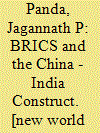

|
|
|
|
|
| Publication |
New Delhi, Institute for Defence Studies & Analyses, 2013.
|
| Description |
124p.Pbk
|
| Series |
IDSA Monograph Series No.24 September 2013
|
| Standard Number |
9789382169246
|
|
|
|
|
|
|
|
|
|
|
|
Copies: C:2/I:0,R:0,Q:0
Circulation
| Accession# | Call# | Current Location | Status | Policy | Location |
| 057458 | 327.10601/PAN 057458 | Main | On Shelf | General | |
| 057459 | 327.10601/PAN 057459 | Main | On Shelf | General | |
|
|
|
|
| 16 |
ID:
173890
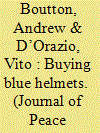

|
|
|
|
|
| Summary/Abstract |
While the evolving nature and proliferation of UN peacekeeping operations in the post-Cold War period is well documented, we know less about how personnel are recruited for these missions. Furthermore, recent developments have rendered existing supply-side explanations for troop contributions less convincing. The increasing demand for personnel, along with stagnant UN reimbursement rates and the rising costs of participation that began during the 1990s, mean that it is less attractive than ever for developing countries to offer their own troops to what have become increasingly ambitious operations. Yet, we see a large pool of developing countries continuing to do so. To address this puzzle, we argue that UN member states with strong preferences for establishing peacekeeping missions have begun using foreign aid as an inducement to help potential contributors overcome the collective action problem inherent in multilateral peacekeeping operations. We uncover strong empirical evidence that these ‘pivotal states’ strategically allocate foreign aid to persuade contributing states to boost their contributions, and also to ensure that these missions continue to be staffed and maintained as costs rise, particularly during the post-1999 period. We also find that states are responsive to these financial inducements: foreign aid increases both the likelihood of contributing personnel and the size of a state’s contribution. Theoretically, this article advances the scholarly understanding of international organizations and cooperation by illuminating an informal, extra-organizational strategy by which IOs can facilitate cooperation.
|
|
|
|
|
|
|
|
|
|
|
|
|
|
|
|
| 17 |
ID:
174053
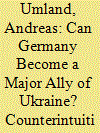

|
|
|
|
|
| Summary/Abstract |
Over the last few years, intergovernmental affairs and the roles of individual countries within the West have started to shift. In response, Kyiv (Kiev) should reorder the priorities and emphases of its foreign political, economic, and cultural policies. The central focus of this re-orientation should be more resolute than the hitherto deepening of Ukrainian relations has been, not only with the German government but also with the broader political elite, industrial companies, and the civil society of the Federal Republic. A recent systematic study of German perceptions of Ukraine can help develop new approaches, initiatives, and policies to reach a new level of German–Ukrainian partnership.
|
|
|
|
|
|
|
|
|
|
|
|
|
|
|
|
| 18 |
ID:
034922
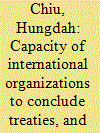

|
|
|
|
|
| Publication |
The Hague, Martinus Nijhoff., 1966.
|
| Description |
xvii, 224p.
|
|
|
|
|
|
|
|
|
|
|
|
Copies: C:1/I:0,R:0,Q:0
Circulation
| Accession# | Call# | Current Location | Status | Policy | Location |
| 001522 | 341.026/HUN 001522 | Main | On Shelf | General | |
|
|
|
|
| 19 |
ID:
150582
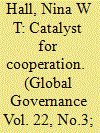

|
|
|
|
|
| Summary/Abstract |
Climate change is predicted to lead to an increasing frequency of natural disasters and humanitarian emergencies, yet scholars have not examined how the humanitarian community is responding to this issue. This article examines its initial engagement with the climate change regime and finds it was remarkably coordinated. Humanitarian agencies coauthored submissions to the UN Framework Convention on Climate Change, and the leaders of major humanitarian organizations spoke on co-organized panels on the humanitarian perils of climate change. In fact, the overarching trend was cooperation, not competition, among humanitarian agencies. This is an intriguing finding as it runs counter to the dominant account of a humanitarian marketplace in which actors are constantly competing for resources. Instead, this article suggests that the Inter-Agency Standing Committee played a significant role in mobilizing and coordinating humanitarian organizations' initial efforts. It highlights how and to what extent institutionalized cooperation between international organizations enables further cooperation in new issue areas and regimes. Scholars of international organizations, global environmental politics, and humanitarianism will be interested in how cooperation emerged in the humanitarian regime and shaped subsequent interaction with the climate change regime.
|
|
|
|
|
|
|
|
|
|
|
|
|
|
|
|
| 20 |
ID:
151595
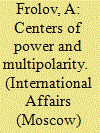

|
|
|
|
|
| Summary/Abstract |
IN 1983, VLADIMIR LUKIN* brought out a book that became a landmark not only for the Institute for the U.S. and Canadian Studies of the Soviet Academy of Sciences, where he worked at that time, but for the entire Soviet scholarly community. It was per se remarkable that the book, entitled Centers of Power: Concepts and Realities, was published at a time when, let me remind you, the Soviet-American confrontation and the rivalry between the two world systems reached their peak and, let's face it, each system professed an ideology that essentially painted a black-and-white picture of the world and claimed to be superior to the other system. Few people could have thought in those days that that state of affairs could come to an end any time soon. The United States was getting ready for a grueling struggle with the Soviets. Almost nobody in either country thought that any third party would ever come forward and throw down the gauntlet to the world's two superpowers. Each system was getting ready for its own historic victory and saw the rest of the world as so many pieces on the chessboard.
|
|
|
|
|
|
|
|
|
|
|
|
|
|
|
|
|
|
|
|
|